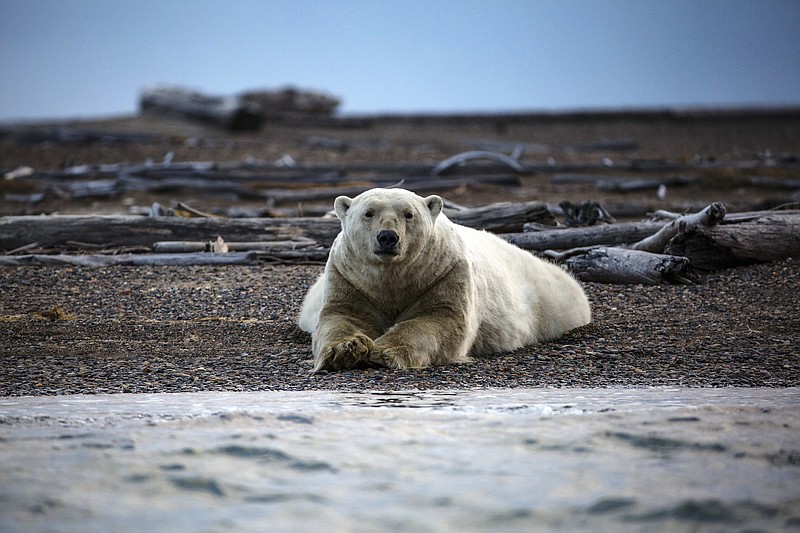It's been a good week for polar bears. The Biden administration suspended oil drilling leases in the Arctic National Wildlife Refuge, erasing another ill-advised Trump signature and delivering on a Biden campaign promise to protect the fragile Alaskan tundra from fossil fuel extraction.
But the polar bears - and all of us - will need more than that to beat climate change.
The decision, announced with a formal order from Interior Secretary Deb Haaland, begins a process that could halt drilling in one of the largest tracts of untouched wilderness in the United States, home to the bears, caribou, migrating waterfowl and as much as 11 billion barrels of oil.
For more than 40 years, Democrats and Republicans have fought over whether to allow drilling there.
And that's not likely to change given the political landscape of Washington. Just consider the many other climate-harming things Biden hasn't yet undone:
In May, the Biden administration defended in federal court the Willow project, a huge oil-drilling operation proposed on Alaska's North Slope that was approved by the Trump administration and is being fought by environmentalists. The Biden administration also declined to act when it had an opportunity to stop crude oil from continuing to flow through the bitterly contested, 2,700-mile Dakota Access pipeline, which lacks a federal permit. Weeks earlier, Biden's administration backed a Trump decision to grant oil and gas leases on federal land in Wyoming.
Those decisions offer a connect-the-dots picture of the political, technical and legal difficulties of extracting our country from the oil, gas and coal industries to which our national economy has been addicted for more than a century.
William A. Galston, a senior fellow in governance studies at the Brookings Institution, told The New York Times that Biden, lacking strong majorities in Congress, "can't afford to take a pure position on the climate. That is the backdrop against which this president and the administration will be making trade-offs on every single issue."
The suspension of leases in the Arctic Refuge may have brought a brief sigh of relief from conservationists, but the Biden administration is not off the hook and the clock is ticking.
"Suspending leases in the Arctic Refuge is a major step forward in keeping President Biden's campaign promise and cutting carbon pollution," Gene Karpinski, president of the League of Conservation Voters, said. "Going forward, we also need to ensure the administration keeps its climate commitment across the board. A 'drill here, don't drill there' approach will not get the job done."
Last month, a landmark report from the International Energy Agency said nations around the world would need to immediately stop approving new coal-fired power plants and new oil and gas fields and quickly phase out gasoline-powered vehicles if they want to avert the most catastrophic effects of climate change - driving average global temperatures above 2 degrees Celsius (a 3.6 degree increase in Fahrenheit) compared with preindustrial levels.
As we've said before here, not paying attention to climate change is both morally and fiscally bankrupt.
The morally bankrupt Trump administration began auctioning the oil and gas leases on 1.5 million of the Arctic Refuge's 19 million acres on the same day the former president stoked his supporters to storm the Capitol - the same day Biden's election was certified by Congress. But the fiscal bankruptcy began with the 2017 Tax Cuts and Jobs Act that included a measure directing the interior secretary to create the leasing program. The law was intended to raise $1.8 billion in revenue for the federal government, but even as the auctioning began, officials said it would raise half that, or less.
Turns out it was way less. The Jan. 6 sale of drilling leases on 11 tracts on 550,000 acres in the refuge netted about $14.4 million - 0.7% of what Republicans initially predicted it would yield. Only two of the bids were competitive, so nearly all of the drilling rights on the pristine Alaskan land sold for the minimum price of $25 an acre.
What's more, we don't need the oil, which is bringing lackluster prices these days, by the way. Banks and investors know this and what they are looking toward instead is alternative energy like solar and wind energy - anything but fossil fuel energy.
Even on the National Petroleum Reserve, where companies have operated for years, more than 90% of the leases sold since 2012 received just a single bid, according to the Washington Post. In fact, in eight of the past nine years, there was not a single competitive bid on that reserve.
Conservatives have long whined that being green costs too much - both in money and in jobs.
Perhaps they need to look again. And do the math.
Bidders aren't bidding on oil leases and bankers aren't financing fossil fuel drilling.
Maybe they know something those so-called conservatives have yet to figure out.
It's not just that polar bears are the newest canaries in the coal mine for us. Playing nasty with Mother Nature and with earth's future just doesn't make good money sense.
